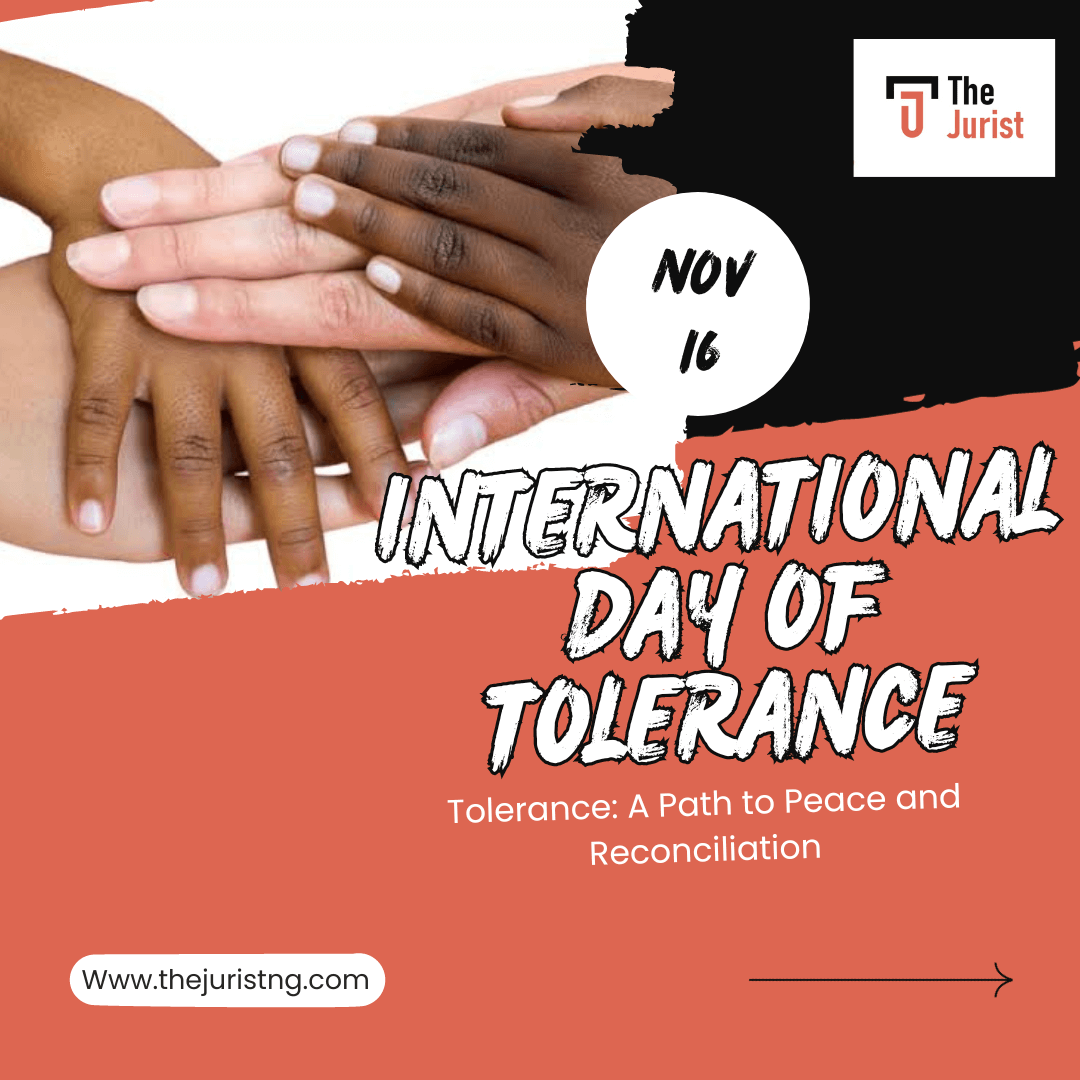In a world marked by its diversity of cultures, beliefs, and traditions, the International Day of Tolerance stands as a poignant reminder of the importance of fostering understanding, respect, and acceptance among all people.
Celebrated annually on November 16, this day serves as a global call to action, urging individuals and communities to embrace diversity and build bridges of tolerance.
In 1995, the UN General Assemy adopted resolution 51/95 proclaiming today as the international day for tolerance.
The theme for the 2023 celebration is “Tolerance: A Path to Peace and Reconciliation”
As crafted by UNESCO, Tolerance is respect, acceptance and appreciation of the rich diversity of our world’s cultures, our forms of expression and ways of being human.
The Origin of International Day of Tolerance
Established by the United Nations General Assembly in 1995, the International Day of Tolerance was born out of the recognition that promoting tolerance is essential for peace, stability, and sustainable development.
It emerged in response to the rising challenges of discrimination, intolerance, and the need for concerted efforts to build inclusive societies.
The International Day for Tolerance is aimed at promoting understanding and respect among diverse cultures and beliefs.
It was however, first marked on November 16, 1995, following a resolution by the United Nations General Assembly.
The UNESCO-Madanjeet Singh Prize was created by UNESCO with an amount of US $100000 in 1995. The prize is awarded every two years to individuals or organizations on International Tolerance Day.
The Prize was established in 1995 on the occasion of the United Nations Year for Tolerance and the 125th anniversary of the birth of Mahatma Gandhi.
For the 2022 edition, the Prize for the Promotion of Tolerance and Non-Violence was given to Franca Ma-ih Sulem Yong from Cameroon, President of the NGOs #Afrogiveness and Positive Youths Africa.
About Madanjeet Singh: Born on April 16, 1924, in Lahore, now part of Pakistan, Madanjeet Singh gained international recognition as an accomplished author, focusing on art and various subjects intricately linked with UNESCO’s principles and programs.
His diplomatic service included ambassadorial roles in Asia, South America, Africa, and Europe, representing India.
In 1995, in appreciation of his lifelong commitment to fostering communal harmony and peace, the UNESCO Executive Board unanimously established the biennial “UNESCO-Madanjeet Singh Prize for the Promotion of Tolerance and Non-Violence.”
This decision was made during meetings held in Paris and Fez (May 16 to June 4) to commemorate Mahatma Gandhi’s 125th birth anniversary.
Taking his dedication further, Madanjeet Singh founded the South Asia Foundation (SAF) in 2000, with the aim of advancing sustainable cultural, educational, and economic development across the region.
Accordingly, in acknowledgment of his philanthropy and tireless endeavors to champion these noble goals, aligning with UNESCO’s mission, Madanjeet Singh was honored as a UNESCO Goodwill Ambassador on November 16, 2000.
A Celebration of Diversity
At its core, the day signifies a celebration of diversity. It encourages individuals to appreciate the multitude of cultures, religions, and perspectives that enrich our global landscape.
Tolerance does not merely imply passive acceptance but an active, engaging effort to understand, learn from, and appreciate one another.
Breaking Down Barriers
The International Day of Tolerance serves as a catalyst for breaking down barriers that divide communities.
By fostering dialogue and encouraging communication, it promotes an environment where people can express their views openly and constructively. This open exchange helps dispel stereotypes, misconceptions, and prejudices that often lead to discord.
Education as a Tool for Tolerance
undoubtedly, education plays a pivotal role in cultivating tolerance. By promoting educational initiatives that highlight the importance of tolerance, inclusivity, and human rights, the day aims to empower individuals with the knowledge and awareness needed to counteract intolerance.
A Call to Action
Beyond symbolic observance, the International Day of Tolerance is a call to action.
It challenges individuals to reflect on their own beliefs and attitudes, encouraging them to embrace diversity in their daily lives. Governments, institutions, and civil society are also called upon to enact policies and practices that promote tolerance and inclusivity.
The Significance in Today’s World
In our contemporary global landscape, marked by interconnectedness and interdependence, the significance of tolerance has never been more crucial.
Challenges such as discrimination, xenophobia, and social divisions persist, underscoring the need for a collective commitment to tolerance as a fundamental value.
This day was established to raise awareness about the importance of tolerance and encourage mutual understanding among different cultures and communities.
The day however, encourages individuals and societies to recognize the value of tolerance, acceptance, and dialogue in fostering peace and preventing conflicts.
The United Nations promotes the principles of tolerance as essential for building a more harmonious world.
Read Also : Taxation in Nigeria, evasion and all you need to know
What you should know
- As we mark the International Day of Tolerance, let us reflect on the profound significance of embracing diversity.
- By recognizing the beauty in our differences, we can build a more harmonious world where understanding triumphs over ignorance, and unity prevails over division.
- It is a day to reaffirm our commitment to tolerance, for in doing so, we contribute to a future where every individual is valued, respected, and included in the global tapestry of humanity.

Leave a Reply